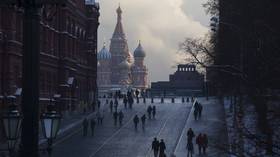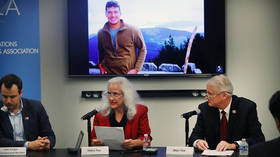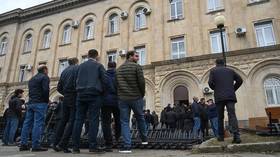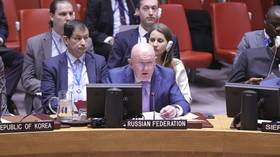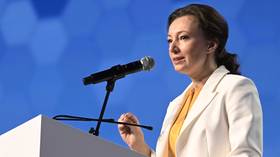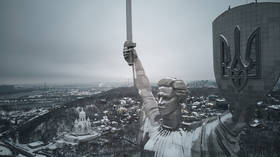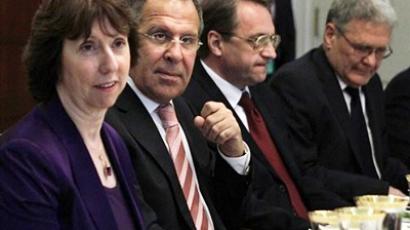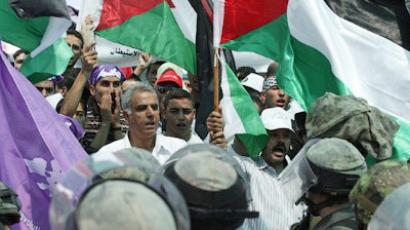Israel undermines Palestinian statehood
Israeli settlers and radical rights groups are gathering in the West Bank to protest the Palestinians' drive for sovereignty at the UN. Police and the armed forces fear the mass marches might turn violent if settlers enter Palestinian lands.
Associated Press reports Israeli settlers in the West Bank have set fire to acres of agricultural land and cut down olive, fig and almond trees. Settlers are marching to Palestinian villages, Arab villages, to lay claim to the land, RT’s Paula Slier reports from the Israeli settlement of Itamah on the West Bank. Seven hundred people are expected to turn out for what is expected to become the largest rally, dubbed “the sovereignty demonstration”, planned to reach Palestinian city of Nablus for Tuesday. Similar marches are happening in several Israeli settlements across the West bank. Palestinian officials said Tuesday that settler attacks on Palestinian property have doubled in the past year, reports the Associated Press.But for several months the Israeli police and defense forces have been gearing up to possible protests from Palestinians over their aspirations for sovereignty. Israeli police have spent over US$35 million on the so-called “Operation Summer Seeds”, aimed to ready the Israeli army for Palestinian “mass disorder”. The Israeli army has been training Jewish settlers in the West Bank and supplying them with tear gas and stun grenades. Landmines have been being planted along the border.Reports call it a show of double standards on the Israeli side against Palestinian marches, while they themselves go and demonstrate.
In fear of "September"
There is a growing sense of isolation among Israelis. For months they have simply named it “September”.And now September is here, with it the unease and uncertainty about what to do when Palestinians ask the United Nations to recognize their state. “I think the responsible thing to do from the [Israel Defense Forces’] point of view is to prepare for any eventuality, prepare for the worst-case scenario and hope it does not happen,” said David Benjamin, a former legal advisor to the IDF.The worst-case scenario is violence. There is even talk of a third intifada.The Israeli army has been preparing for months, beefing up security on settlements and planting new landmines along Israel’s northern borders.But many complain these measures go too far.“Now they are trying to put mines to kill people,” said Salman Fakhiredeen from Al-Marsad Arab Center for Human Rights. “Maybe it is more comfortable for the state to kill people by mines, more than shooting them.”The last thing Tel Aviv wants is a repeat of the chaos at its borders three months ago. Twenty protestors were killed by Israeli fire when hundreds of demonstrators stormed the Israeli-Syrian border in a show of sympathy for the Palestinians.The area is littered with mines – an added danger to those clamoring there.“The mines are not necessarily there to deal with people who have peaceful intentions. But mines are a legitimate form of defense. Many countries have mines on their borders for that reason,” explained Benjamin.In one of its internal magazines, the Israeli army said it was planting new mines in the area as a deterrent against any future demonstrations that might take place.Crowds are expected to surge forward when Palestinians put forward their case at the United Nations.The army refused RT’s request for an interview. The most they would give was an email response that said they were performing ongoing situation assessments and doing everything required in order to ensure that the daily routine and security of Israel’s northern borders was maintained.But it was not security that tore off the right half of Saleh Barar’s body. He lost a leg, a hand and an eye when he picked up a mine when he was 13 years old. It was a moment that changed his life forever.“They say ‘Oh, sorry Saleh, what happened to you,’” Saleh Barar said. “And sometimes, I hear some people, they say ‘Maybe it was better if he died, because how he can continue life, he is like half-human.’”He got little sympathy from the Israeli government, which blamed him for being in an area infamous for mines. But instead of hate and anger, Saleh wants his misfortune to be a warning to others.And he is now dreading what will happen if thousands of people surge towards the borders later this week.“I feel very, very, very sad,” he says. “Because I know landmines, bombs and dangerous material, they just make people die. They didn’t give flowers or good life for the people.”It is nine months since the Arab Spring began, and as Palestinians lobby the United Nations, the last of the region’s old certainties are being swept away.As fears in the region are growing that what happens in New York will set the stage for the next Middle East crisis, Paul Larudee from the Free Palestine Movement thinks that the scenario of the UN vote can be told well in advance. “Most of the world countries will be in favor of admitting Palestine as a state to United Nations and it will be vetoed by the United States, except that, in fact, the General Assembly can allow the new state of Palestine to be admitted as a non-voting member to the General Assembly of the UN.”Even if the statehood bill gets through the Free Palestine member believes it won`t change a thing, “it will be almost entirely symbolic and it won`t change anything on the ground,” because “Israel controls what is left in Palestine.”




